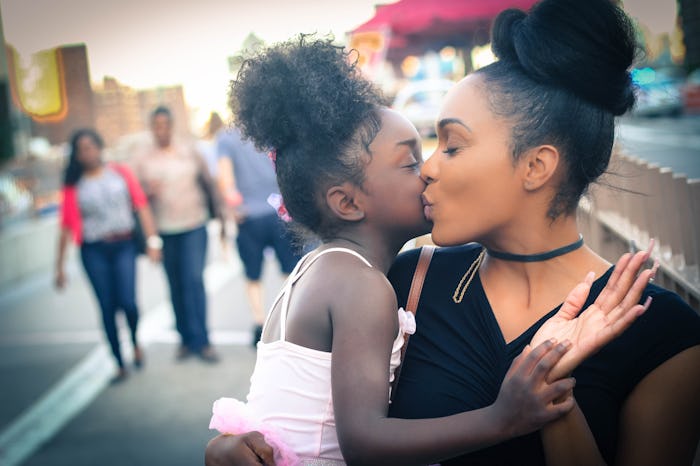Life
What Experts Want You To Know About Calling Your Children "Good" Boys & Girls
The other day, I stubbed my toe on a crate of toys and uttered a special four-letter word to the equivalent of "crap." It slipped from my mouth before I even had time to assess the situation — my 2-year-old daughter sitting nearby. Like everything I say and do, Claire repeated the curse word. She hasn't said it again since, but it was yet another reminder to be mindful. But what about praise? Is it OK to call your children smart? Is it OK to tell your kid they're "good"? How can you use positive reinforcement without putting a label on your little one?
"When we use labels like ‘good girl’ or ‘good boy,’ it usually means our child is going along with what we want," Kimberly Hershenson, a NYC-based therapist tells Romper in an email interview. "Yes, we should teach our children to be respectful and follow direction, but just because our child wants to keep playing and we need to leave the house, it doesn't mean they are 'bad.' If our children become accustomed to these labels, what happens in instances we don't use them? Does that mean our children aren't being 'good'?"
That's why therapists and child psychology experts agree across the board that phrases like "good boy" or "good girl" are only effective when the action is specifically praised.
"Saying 'good girl' or 'good boy' to children is only valuable when accompanied by a qualifying statement," Barb Harvey, an early childhood expert and parenting coach, tells Romper in an email interview. "Otherwise, it is just a random statement with no real meaning to kids. Children want to please their parents and other adults in their lives. The only way for children to be able to do so repeatedly is to know exactly how they are getting that approval."
Harvey, who is also the executive director of Parents, Teachers and Advocates, Inc., says the better way to praise a child using the term "good," is to say something to the effect of, "You are such a good girl. I like the way you came right in and hung up your coat. That makes me very happy."
"Adults give children all the information they need to repeat a behavior," Harvey adds. She suggests that parents help support positive self-talk in their children by offering statements about not just what they do but who they are, like, "You are such a good boy. I really like the way you showed compassion to Sammy when he apologized."
"It is really not the use of good girl/boy which is important," she says. "It is the qualifier which gives children the ability to not only please, but to do so repeatedly."
Parenting coach Elisabeth Stitt explains the reason for this is because "vague praise is hard to reproduce." While it might feel good in the moment, it is meaningless and can often make a child feel insecure.
"With concrete, specific praise, on the other hand, a child knows exactly what to do next time" Stitt says. "When a parent says, 'You did a good job of getting every last crumb cleaned up,' that is very specific. A child can make sure he gets every last crumb the next time and once again please his parent."
On the other hand, Stitt says, if a child does not succeed in a particular task, but a parent still acknowledges the effort, then "the child feels confident that effort is worthwhile and will strive to put effort in again in the future." Effort praise includes statements like, "The extra practice you put in really shows in how smoothly you now play that piece of music." Stitt says, "That clarity lets a child know what strategy to use next time for improvement."
Here's hoping my lack of clarity on that fateful morning will leave my daughter less-than-enthused about repeating my utterance. A mom can only hope, right?
Check out Romper's new video series, Romper's Doula Diaries:
Check out the entire Romper's Doula Diaries series and other videos on Facebook and the Bustle app across Apple TV, Roku, and Amazon Fire TV.
